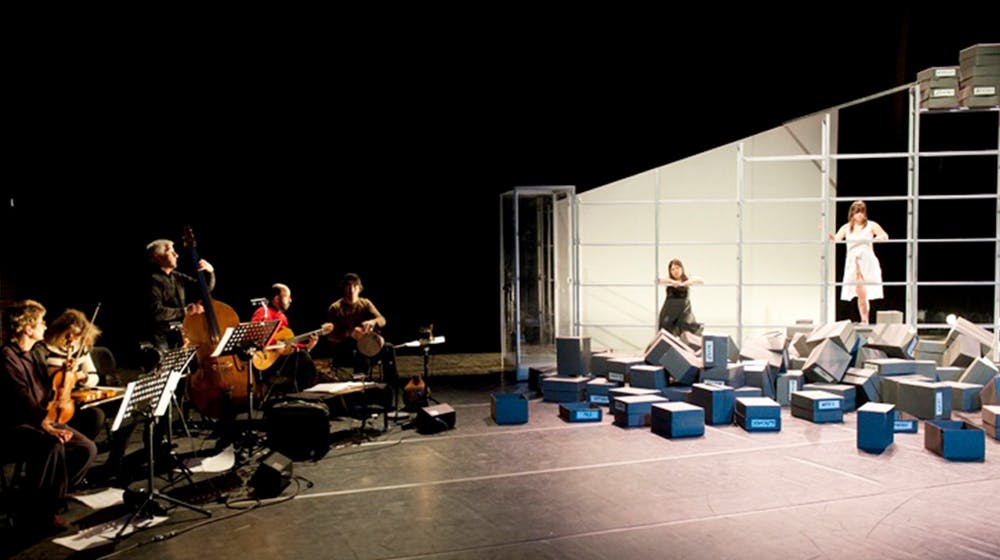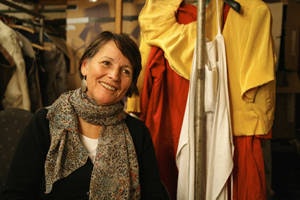Interview with Gisela Höhne, Director of the Berlin RambaZamba Theatre (24 February 2012)
Do disabled people have a right to perform in the theatre?
Yes, of course. Every person has the right to be an actor. The only requirements are that they are talented for it. The difficulty for people with disabilities is training. You have to find the space where you can play.
To me, acting means having an acting competence, knowing that I am playing something, having any kind of role and being aware that I am playing it in front of others. This means that a disabled person can also be an actor. It must be a conscious creative process. We are not all the same. To interact naturally without eliminating the differences is the artistic challenge.
What does RambaZamba mean?
It started with a theatre. We established an art workshop 21 years ago, which included the RambaZamba. Today, the entire art workshop shares this name. Over 60 handicapped people work here, 40 of whom are actors and actresses. 36 of them have jobs in specialised workshops for people with disabilities. About 20 feature-length plays have been rehearsed and performed so far. We have been on guest performance tours all over Europe about 180 times. Otherwise, the theatre is a humble establishment run by only a handful of people. Including people without disabilities.
And the term “RambaZamba”, what does it mean?
To be wild, to cross boundaries, to disregard rules and to ultimately achieve something that everyone enjoys. I'm going RambaZamba now means that I'm going to shake it all up.
How does one become a member of the ensemble?
There are applications and internships. In addition to talent, there must be long-term enthusiasm. Without exuberant joy of playing, you cannot sustain the commitment. It is also exhausting. The largest group among our actors are about 12 people with Down syndrome. This is connected to the observation and reenactment skills of these people. Children with Down syndrome have a long observation period before they become active.
Disabled actors are regularly seen in international feature films today. Why not on stage?
Yes, that's right, but in movies they are used as representatives of their disability. They mostly play themselves. They are not given “normal” roles there. Wheelchair users play wheelchair users. People with Down syndrome only get roles with Down syndrome. The situation is different for actors without disabilities, who frequently portray people with disabilities. Movies, which use many new materials, invent characters with disabilities much more often than theatre does. It is difficult to say why modern theatre does not incorporate such roles.
Maybe there is no demand?
Experience has taught us one thing: actors dislike going on stage with children and animals. These easily attract all attention. It is not easy to stand out against this. The same applies to people with disabilities on stage. They can be so themselves, so authentic, that even very good actors struggle alongside them. In this context, the self-reference of actors with disabilities plays a crucial role. An Ophelia with Down syndrome always remains recognisable as such. Perhaps the audience is not yet ready to accept that. But even the theatre professionals find this difficult to accept.
If our theatre, which already employs actors with disabilities at all levels, was better equipped, it could bring about a change. Mixed casts or even entire ensembles in which actors without disabilities are integrated become possible.
For whom do you play? Who is your audience?
It has become quite a diverse audience. It started with parents and friends. Parents still come to the premiere, of course, and from time to time to see the performance again. Friends are still coming. We have real RambaZamba regulars. Frequently, apprentices in social professions visit us as well. We organise performances just for them.
The evening performances are attended by a relatively “normal” audience, but certainly with an interest in theatre. You often hear: “Kids, this is still theatre.” There is a RambaZamba fan community in Berlin and all over Germany. And even actors like to come and watch it.

